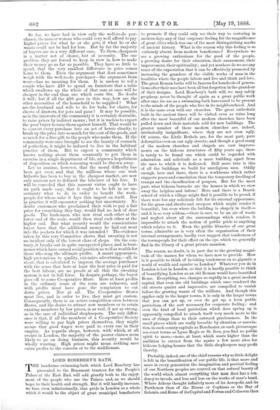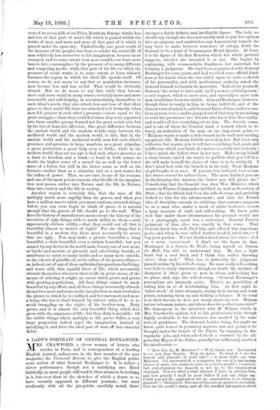LORD ROSEBERY'S BATH.
THE handsome swimming-bath which Lord Rosebery has presented to the Beaumont trustees for the People's Palace at the East End, will add greatly both to the enjoy- ment of the people who use the Palace, and, as we should hope, to their health and strength. But it will hardly increase, we fear, even irAnitesimally, that pride in London as a whole which it would be the object of great municipal benefactors
to promote if they could only see their way to restoring in modern days any of that corporate feeling for the magnificence of great cities which was one of the most distinguishing marks of ancient history. What is the reason why this feeling is so curiously absent from modern beneficence ? Everywhere we see a growing enthusiasm for the good of the people, a growing desire for their education, their amusement, their improvement, their spirituality ; and yet nowhere do we see any trace of the expectation that it can be effectively promoted by increasing the grandeur of the visible works of man in the localities where the people labour and live and think and love. The great Roman baths will be famous for hundreds of genera- tions after their uses have been all but forgotten in the grandeur of their designs. Lord Rosebery's bath will, we may safely prophesy, never be thought of again as a great public work after once its use as a swimming-bath has ceased to be present to the minds of the people who live in its neighbourhood. And it is the same even with our churches. The great cathedrals built in the ancient times will be visited even as ruins long after the most beautiful of our modern churches have been pulled down and their materials sold for new buildings. The greater number of these modern churches are, indeed, intrinsically insignificant, where they are not even ugly. Of course, the Little Bethels are, for the most part, pure deformities even on our ugly streets ; and though a good many of the modern churches and chapels are vast improve- ments on the hideous structures of fifty years ago, there is rarely to be found one which could be regarded with admiration and solicitude as a mere building, apart from the uses to which it is dedicated. Still more true is this of all the buildings we build for unreligious uses. Oddly enough, here and there, there is a workhouse which rather suggests peace and consolation than the temporary dwelling of tramps and the classification of paupers. But for the most part, what hideous barracks are the houses in which we stow away the helpless and infirm ! Here and there is a Board- school of which a village might find it possible to be proud, if there were but any solicitude felt for its external appearance, for the grass and shrubs and creepers which might render it beautiful ; but even where the building is shapely in itself,— and it is so very seldom,—there is sure to be an air of waste and neglect about all the surroundings which renders it impossible to attach the notion of public pride to anything which relates to it. Even the public libraries of our great towns, admirable as is very often the organisation of their internal arrangements, hardly ever suggest that tenderness of the townspeople for their effect on the eye, which we generally find in the library of a great private mansion.
The reason, no doubt, is in part due to the growing magni- tude of the masses for whom we have now to provide. How is it possible to think of lavishing tenderness on so gigantic a world of wealth and squalor as London? Whatever you do in London is lost in London, so that it is hardly possible to think of beautifying London as an old Roman would have beautified Rome. Everything, too, changes so rapidly in a great modern capital, that even the old buildings which once rendered the old streets quaint and impressive, are compelled to vanish before the growing wants of the millions. And though this applies only to the larger towns, it is only in the larger towns that you can get up, or ever do get up, a keen public patriotism, of the sort necessary for corporate feeling ; and even the kind of local patriotism which does spring up is apparently compelled to attach itself very much more to the uses of things than to their outward graciousness. In the small places which are really loveable by situation or associa- tion, in such county capitals as Dorchester, or such picturesque sea-coast towns as Lyme Regis or St. Ives, you find no public spirit to move,—none, at least, which soars higher than the ambition to extract from the squire a few more sites for hideous lodging-houses that the little shopkeepers may profit thereby.
Probably, indeed, one of the chief reasons why so little delight is felt in the beautification of our public life, is that more and more in every generation the imagination and poetical feeling of our Northern peoples are centred on that natural beauty of the world which almost everything that man does has a ten- dency to invade, and less and less on the works of man's hand. Where Athens thought infinitely more of its Acropolis and its Parthenon than of the Disarm or Cephisus or the Bay of Salamis, and Rome of its Capitol and Forum and Coliseum than even of its seven hills or its Tiber, Northern Europe thinks less and less of that part of man's life which is passed within the works of men, and more and more of that part of it which is passed under the open sky. Undoubtedly, one great result of the increase of the peoples has been to render the social life of man relatively less attractive to his imagination, because more cramped, and to some extent even more sordid,—at least more beaten into commonplace by the pressure of so many different and competing needs ; while that part of his life on which the pressure of social wants is, to some extent at least, relaxed, becomes the region in which his ideal life spends itself. Of course, we do not mean to say that as population increases, men become less and less social. That would be obviously absurd. But we do mean to say that while they become more and more social in many senses, certainly more and more reasonable and self-denying in accommodating themselves to each other's needs, they also attach less and less of that ideal grace to their social life than was attached to it formerly, when men felt greater in each other's presence,—more equal to the great struggle,—than they could feel when they were separated into those smaller groups formed not for great social acts, but by the ties of domestic affection. One great difference between the ancient world and the modern world,—nay, between the medmval world and the modern world, is this, that in the ancient world and the medimval world, men felt each other's presence, and presence in large numbers, as a great stimulus, a great protection, a great help even to faith ; while in the modern world, they are too apt to feel each other's presence as a limit to freedom and a bond,—a bond in both senses no doubt, the higher sense of a sacred tie, as well as the lower sense of a fetter, but still in the latter sense as well as the former,—rather than as a stimulus and as a new source for the influx of power. That, we are sure, is one of the reasons, and one of the most potent reasons, why the life of the imagina- tion now passes rather into Nature and the life in Nature, than into society and the life in society.
Another reason is certainly this, that the uses of life multiply much more rapidly than its graces, and when you have a million uses to which you must conform outward things, before you can even begin to think of grace, it is natural enough that the graces of life should go to the wall. What does the history of manufacture mean except the history of the invention of ugly things with so much utility in them,—such oppressively obvious utility,—that they crowd out all that is beautiful, almost as matter of right P For one thing that is beautiful in a modern city, there must necessarily be scores that are ugly. Yon may make a picture beautiful, a lamp beautiful, a chair beautiful, even a curtain beautiful ; but you cannot by any device in the world make beauty out of raw meat, or bricks and mortar, or placards and advertising boards, or omnibuses to carry so many inside and so many more outside, or the odours of paraffin oil, or the refuse of the poorer alleys,— or, indeed, out of any of these unfinished preparations for living, and worse still, that squalid litter of life, which necessarily obtrude themselves wherever there is life in great excess of the means of ordering it aright, an excess which grows and grows with growing populations. All these things cannot be made beautiful by any effort, and all these things necessarily obtrude themselves more and more on the imagination as man overtakes the planet to which he is confined, and becomes more and more a being who has to limit himself by stricter rules, if he is to avoid trampling on the rights of his brother-men. Duty grows, and it is almost the only beautiful thing which does grow, with the exigencies of life ; but then, duty is invisible. Of the visible things which multiply as life grows fuller, a very large proportion indeed repel the imagination instead of satisfying it, and drive the ideal part of man off into unsocial fields.



































 Previous page
Previous page